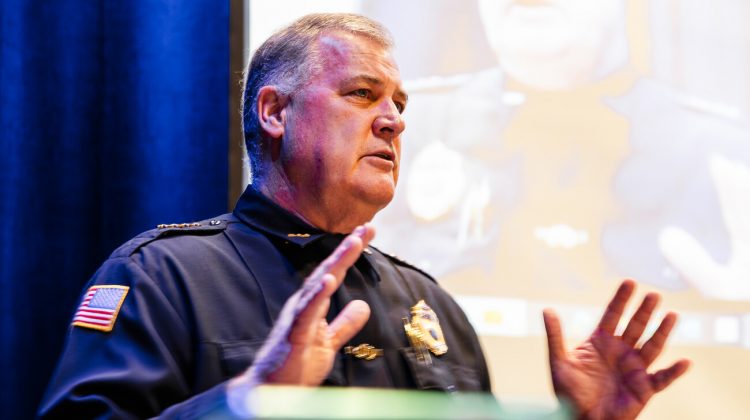LYNN — Police Chief Christopher Reddy and Deputy Police Chief Mike Vail unveiled the department’s goal to install 50 security cameras in public areas throughout the city Wednesday morning at the Lynn Chamber of Commerce’s Government Affairs Committee meeting.
Speaking before both a group of virtual attendees on Zoom and an audience of roughly 10 seated at the Lynn Community Television studio, Reddy announced that the department will soon add 10 Flock Safety cameras — capable of capturing and recording vehicles’ license plate numbers — at high-traffic areas throughout the city.
In 2021, Reddy said City Hall approved funding for purchasing and installing 15 Flock cameras to help police officers track and locate stolen vehicles or vehicles involved in criminal investigations. Reddy said the department recently received funding to install an additional 10 cameras.
Since the City installed its first set of Flock cameras, Reddy said the technology has been extremely helpful in law enforcement’s pursuit of stolen vehicles. Because Flock data is shared between participating police departments, Reddy added that the camera network is extremely beneficial for spotting suspect vehicles as they exit and enter Lynn.
“In 70% of the cases (of car theft) where there was no opportunity for pursuit, we were able to stop them, which is really helpful,” Reddy said. “It’s been very, very effective in helping to hold people engaged in criminal activity accountable. There are certainly cases where we would never be able to identify those suspects if not for technology like this.”
To ensure privacy, Reddy said all footage from Flock Safety is deleted after 30 days on a rolling basis, and the cameras cannot automatically recognize drivers’ faces, only license plates.
Alongside the Flock Safety camera system, Reddy said the Police Department is seeking funding to purchase roughly 50 security cameras that would be stationed in public areas throughout the city, such as parks and intersections.
“It’s a way to track the movement of suspect vehicles that are involved in crime. It’s a way to monitor areas in live time if there’s something significant occurring, and it’s a way to assess traffic problems. We think that there’s a significant need (for public security cameras),” Reddy said.
Arguing that the cameras would help officers monitor imminent public safety risks and crimes from the police station, Reddy assured the public that the department would protect the public’s privacy, as the cameras would not be stationed within view of residents’ homes.
While gathering video evidence in criminal investigations, Reddy said Lynn Police are currently tasked with asking residents near a crime scene for their doorbell camera or home security footage before piecing together clips of a suspect or suspect vehicle. Public cameras, he added, would expedite and facilitate the otherwise arduous criminal investigation process.
“We would hope to have a system that, over time, would allow us to incorporate cameras from City buildings or even if some commercial property owners wanted to give us access to (their cameras) and have it all to be accessed right from inside the station. That way, we can track these vehicles of this activity in a manner that helps us to save a lot of time,” Reddy said.
When an audience member asked Reddy whether the security camera footage would be made available to the general public, Reddy responded that while police would not voluntarily distribute it, residents would be able to file a written request for security camera footage under the Freedom of Information Act.
Ensuring that residents’ privacy would be respected should the department receive funding for the new cameras, Vail added that police would not monitor the camera feed live 24/7.
“They’re not monitored live, it’s impossible. Say there’s a shooting in the Lynn Commons; we could tap into the Commons’ cameras and then send our tactical response that way and see what’s going on. If there’s a parade, or there’s some type of community event, we could monitor them… It’s more that if a call comes in, we can access those cameras and better deploy our resources and see what’s going on,” Vail said.
When Councilor-at-Large Nicole McClain asked Reddy if the department would request funding for more cameras in the future, Reddy responded that while 50 cameras would make a good starting point, the department would be willing to install as many cameras as the City would be willing to fund.
“When you think about a city of our size, 50 is not a lot, but I think we need to start somewhere, learn from it, and then see how we want to build it out,” Reddy said. “In cities like Lawrence and Lowell, there are literally hundreds of these cameras available — this is not anything new, and they do this effectively. They do it with privacy protections in place, and they do it with the general public’s concerns in mind.”

